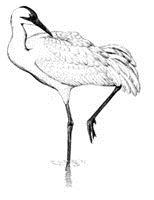North American Crane Working Group

Proceedings of the North American Crane Workshop
Date of this Version
2010
Document Type
Article
Citation
Garland, J., and K. Klink. ICF conservation education: bridging crane conservation and the international education community. In: Hartup, Barry K., ed., Proceedings of the Eleventh North American Crane Workshop, Sep 23-27, 2008, Wisconsin Dells, Wisconsin (Baraboo, WI: North American Crane Working Group, 2010), p. 200.
Abstract
Education, at multiple levels with audiences in Wisconsin, Florida, Texas, and along the flyways where sandhill (Grus canadensis) and whooping cranes (G. americana) sometimes find themselves in close quarters with people, is the key to protecting North America's cranes. The migration of these birds highlights the dependence of cranes and other wildlife on wetlands along the migration routes. Most of these wetlands are privately owned, so the decisions and conservation outlook of future generations are critical to the survival of these cranes. The International Crane Foundation's (ICF) conservation education programs and materials focus on the importance of crane and wetland conservation, and encourage students and educators to learn about similar issues internationally. Education programs connect teachers with the conservation community through cross-curricular resources directly linked to academic standards, teaching methods and learning styles, as well as local conservation challenges and needs. ICF has embraced the opportunity to develop and evaluate programs and resources to compliment academic standards as well as the needs and pressures of the K-12 classroom teacher. By creating diverse and cross-curricular learning environments and experiences, the ICF Conservation Education Department is dedicated to bringing people face-to-face with the challenges and successes of crane conservation and strives to give educators and their students the knowledge, inspiration, and the tools to commit to contributing to environmental solutions.
Included in
Behavior and Ethology Commons, Biodiversity Commons, Ornithology Commons, Population Biology Commons, Terrestrial and Aquatic Ecology Commons


Comments
Reproduced by permission of the North American Crane Working Group.